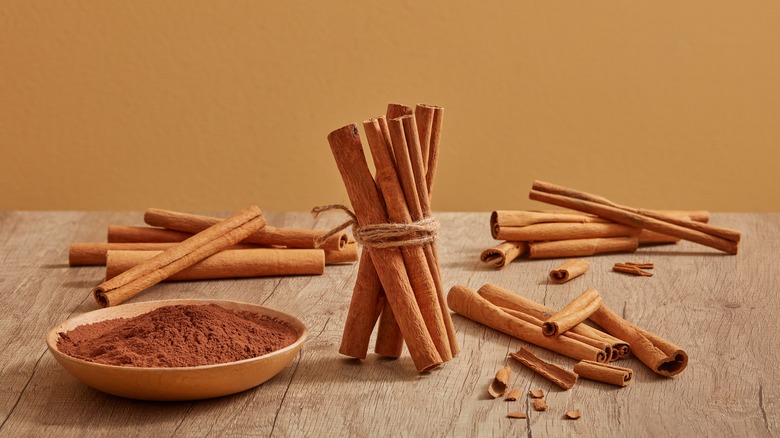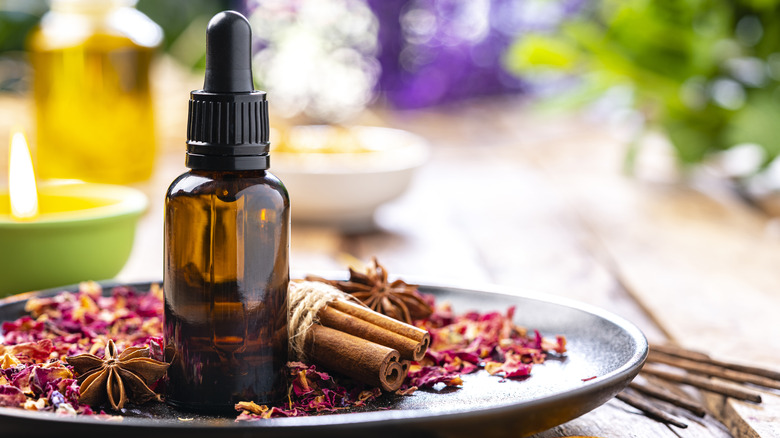What Happens To Your Gut When You Eat Cinnamon Every Day
The warming aroma of cinnamon makes any kitchen smell like home. Cinnamon adds just that little bit of biting spice to cookies, and it makes a nice finish on top of a latte. You'll even use cinnamon in your savory Indian curries. Cinnamon is one of those spices you can eat at every meal, just as long as you don't challenge yourself to eat a spoonful of dry cinnamon.
You won't find too much nutrition in cinnamon aside from a little calcium, potassium, and beta-carotene. However, cinnamon has natural antimicrobial properties that can protect you from a range of bacteria, fungi, and yeast, according to a 2014 article in Evidence-Based Complementary and Alternative Medicine. Cinnamon essential oil has cinnamaldehyde and trans-cinnamaldehyde that contribute to its medicinal properties. Cinnamon bark has procyanidins and catechins, which are flavonoids that work as antioxidants. When you eat cinnamon every day, you can improve the diversity of bacteria in your gut.
Cinnamon and gut health
A 2022 article in Nutrients looked at the relationship between how often people used culinary herbs and the composition of their gut bacteria. People who used herbs rich in polyphenols or with antibacterial properties had higher levels of Firmicutes and lower levels of Proteobacteria in the gut. Using multiple herbs frequently (more than three times a week) was associated with more Firmicutes and less Proteobacteria, even after considering dietary habits. Cinnamon was one of the top herbs that were rich in polyphenols and antibiotic properties.
Cinnamon extract might help relieve diarrhea, according to a 2023 study in Food & Function. Researchers created cinnamon water extract capsules made from Cinnamomum cassia branches. For eight weeks, one group with diarrhea took the cinnamon capsules while another group with diarrhea took a placebo. The group taking the cinnamon capsules had slower digestion (colonic transit time), and they also had higher levels of isobutyric acid in their system, which is good for the gut microbiome. Researchers also found that the cinnamon group had more diverse gut bacteria and an abundance of bacteria linked to better digestion and gut health.
Other health benefits of cinnamon
The essential oil from cinnamon cassia, mainly made of cinnamaldehyde, can stop the growth of many bacteria, including Staphylococcus aureus, and fungi like Candida species and molds. According to a 2006 article in The American Journal of Chinese Medicine, both the oil and pure cinnamaldehyde are effective in small amounts against these microbes. Even when cinnamon is digested, its bioactive compounds like cinnamic acid remain to maintain the antioxidant and anti-inflammatory effects, according to a 2023 article in Foods.
A 2014 article in Evidence-Based Complementary and Alternative Medicine said cinnamon metabolites and compounds isolated from cinnamon may help protect the brain from damage and improve symptoms of diseases like Parkinson's and Alzheimer's. Polyphenols in cinnamon have been found to reduce blood glucose and cholesterol in animal studies. Cinnamon extract could enhance insulin secretion and protect the pancreas from oxidative stress and inflammation. Procyanidins and cinnamaldehydes can prevent tumors from growing by cutting off their blood supply. Compounds in cinnamon can also protect the heart by reducing blood pressure.



